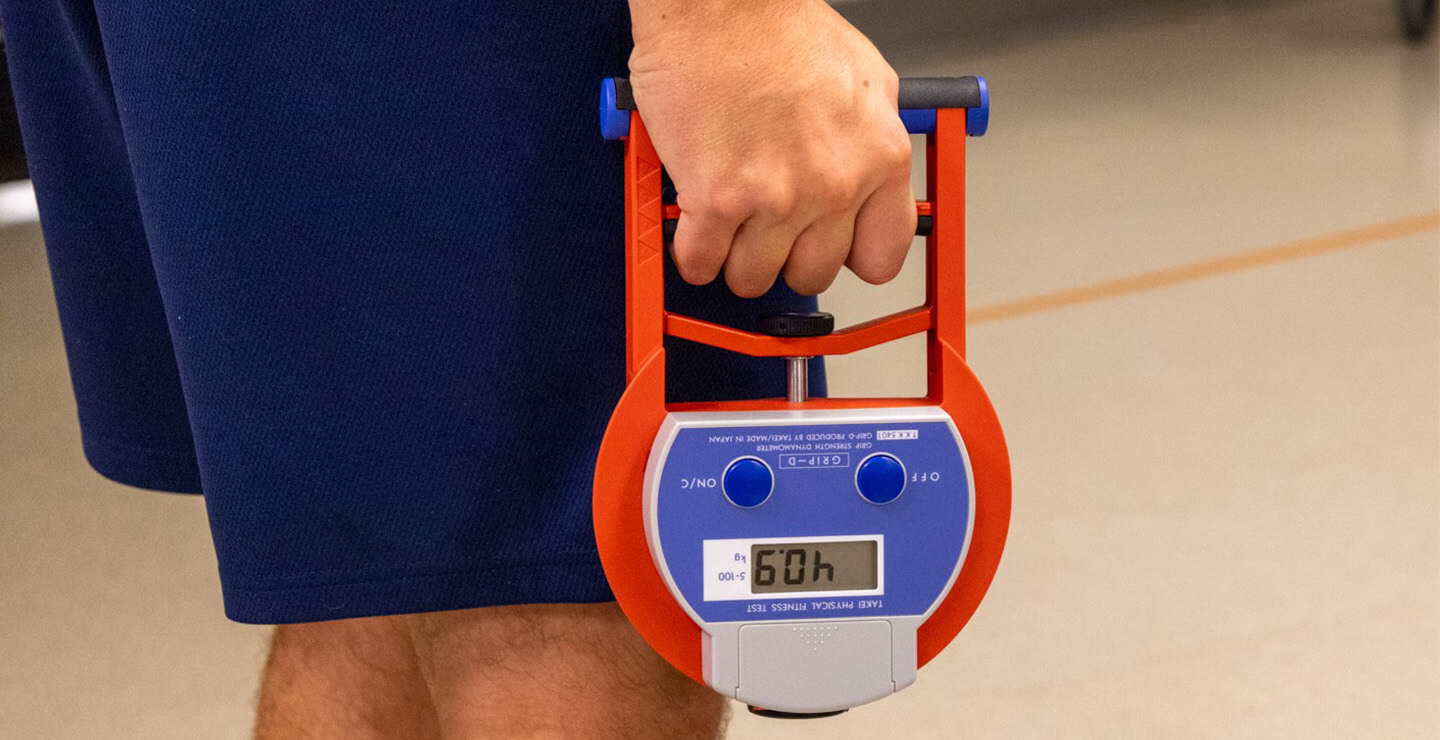Grip Strength Identified as Simple Method for Identifying Individuals at Risk for Obesity-related Complications
October 20, 2025 · Baton Rouge, LA
Pennington Biomedical researchers, international collaborators investigated relationship between grip strength and trajectory of obesity progression
People with obesity who also have high muscle mass may be less likely to have obesity-related
organ damage. This observation was described in the study “Handgrip Strength and Trajectories of Preclinical Obesity Progression: A Multistate
Model Analysis Using the UK Biobank,” which was published in the Journal of Clinical Endocrinology & Metabolism. Dr. Yun
Shen and Dr. Gang Hu of Pennington Biomedical Research Center, along with international
colleagues, recently explored the association between grip strength and preclinical
obesity progression. For more information contact: Joe Coussan, Media Relations Manager, joe.coussan@pbrc.edu, 225-763-3049 or Ernie Ballard, Senior Director of Communications & Marketing, ernie.ballard@pbrc.edu, 225-263-2677. About the Pennington Biomedical Research Center The Pennington Biomedical Research Center is at the forefront of medical discovery
as it relates to understanding the triggers of obesity, diabetes, cardiovascular disease,
cancer and dementia. Pennington Biomedical has the vision to lead the world in promoting
nutrition and metabolic health and eliminating metabolic disease through scientific
discoveries that create solutions from cells to society. The Center conducts basic,
clinical and population research, and is a campus in the LSU System. The research enterprise at Pennington Biomedical includes over 600 employees within
a network of 44 clinics and research laboratories, and 16 highly specialized core
service facilities. Its scientists and physician/scientists are supported by research
trainees, lab technicians, nurses, dietitians and other support personnel. Pennington
Biomedical is a globally recognized state-of-the-art research institution in Baton
Rouge, Louisiana. For more information, see www.pbrc.edu.
Pennington Biomedical Research Center
Researchers evaluated data from more than 93,000 participants from the UK Biobank
to analyze the association between grip strength and the progression of obesity-induced
organ dysfunctions or death. The research found that participants with a stronger
handgrip, which is a simple test of muscle strength, were less likely to progress
to obesity, obesity-induced organ issues, or death.
“Our findings show that muscle strength is a powerful, early sign of who is most at
risk of developing obesity-induced organ dysfunctions among people with excess body
fat,” said Dr. Shen, assistant professor at Pennington Biomedical’s Chronic Disease
Epidemiology Lab. “Because grip strength is easy to measure and strength can be improved
with weight training, this research points to a practical, low-cost way to identify
at‑risk individuals and to act early. This link was consistent in multiple checks
using other muscle metrics, including the muscle-to-weight and lean-to-weight ratios.”
The researchers evaluated data from people in the “preclinical obesity” stage, which
is when body fat and size measures higher than average, but obesity has not resulted
in further illnesses or comorbidities. Obesity is defined as a body mass index (BMI)
of 30 or higher, which uses a person’s height and weight to classify weight status
and assess their potential health risks. It is not, however, a direct measure of body
fat. Excess body fat refers to an excessive accumulation of adipose tissue that impairs
health by increasing the risk of metabolic, cardiovascular, musculoskeletal diseases,
and certain cancers. More direct assessments of body fat percentage are often used
alongside BMI to accurately characterize excess adiposity.
“Our analyses demonstrate that muscle strength serves as a key physiological indicator
linking body composition to metabolic health outcomes,” said Dr. Hu, director of Pennington
Biomedical’s Chronic Disease Epidemiology Lab. “These results emphasize that maintaining
muscle strength may play a protective role against the adverse effects of excess adiposity
on major organs. Using grip strength as an indicator may facilitate timely interventions
aimed at mitigating long-term metabolic and cardiovascular complications.”
The grip strength test has been increasingly recognized as a predictor of chronic
disease risk and mortality, as it can provide better insights as to what proportion of body weight is lean muscle versus adipose tissue. The data from the UK Biobank include an initial recording of data and a 13-year
follow-up. The data indicated that people with stronger handgrip strength, associated with an increased proportion of muscle mass, were less likely to move from the early stages
of obesity-related health issues to more serious ones.
"This study exemplifies our commitment to understanding obesity as the complex, chronic
disease it truly is," said Dr. John Kirwan, Executive Director of Pennington Biomedical.
"By discovering how muscle strength protects against metabolic harm, we're giving
clinicians and individuals a simple, accessible tool to identify risk early and take
action before chronic disease develops. At Pennington Biomedical, our mission is to
move science from cells to society, transforming research into real-world solutions
that help people live healthier lives."
When comparing the data, those participants with the strongest grips had the best
protection against health decline and death and were 23 percent less likely to die
from any cause than those with the weakest grip strength.
6400 Perkins Road
Baton Rouge, LA 70808



